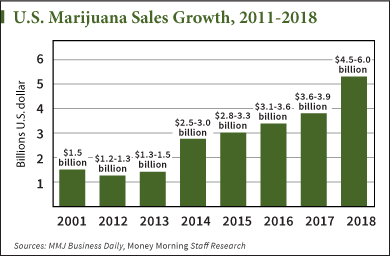 Criminals have taken full advantage of the burgeoning marijuana industry - which grew from $1.5 billion in 2013 to $2.7 billion in 2014.
Criminals have taken full advantage of the burgeoning marijuana industry - which grew from $1.5 billion in 2013 to $2.7 billion in 2014.
Investors in marijuana penny stocks lost a whopping $23.3 billion in 2014 alone.
That was despite an SEC crackdown.
In May 2014, the agency warned the public that "fraudsters often exploit the latest growth industry to lure investors with the promise of high returns." It issued temporary trading suspensions of five different marijuana penny stocks (FusionPharm Inc., Cannabusiness Group Inc., GrowLife Inc., Advanced Cannabis Solutions Inc., and Petrotech Oil and Gas Inc.).
The SEC said it questioned "the accuracy of publicly available information about these companies' operations." Then in November, the agency formally charged four men with marijuana penny stock manipulation.
Here's how scammers used pot stocks to swindle investors out of billions - and which three cost investors most...
How Scams Using Marijuana Penny Stocks Work
 Two factors make penny stocks more risky than other stocks.
Two factors make penny stocks more risky than other stocks.
First, they do not meet rigorous requirements of the New York Stock Exchange or other large exchanges. Instead, they're listed on dealer networks like OTC Markets - which have fewer listing standards.
Second, penny stocks trade for less than five dollars. The low price makes penny stocks extremely volatile.
Stock manipulators use this volatility to their advantage in "pump and dump" schemes. They buy a large chunk of shares in a company. Then they convince a mass of investors to buy those shares as well, which shoots up stock value ("pump"). The fraudsters then sell off their own shares ("dump"), which leaves investors with deflated stock price.
According to investment community Openfolio's data, marijuana penny stocks had the most drastic highs and lows of any industry penny stocks in 2014 - they have fallen 88% from their peak in the last year, compared to a 45.2% average decline of penny stocks across other industries.
"The volatility is mostly due to the novice investors who are flooding into the stocks on the promise that they'll find riches with the decriminalization/legalization of marijuana," Openfolio representative Simon Burns told Motherboard in an email. "In reality, few public marijuana companies are well positioned to capture this growth."
Of all the marijuana penny stocks' dramatic falls, these three contributed most to the $23.3 billion investors lost in 2014...
Three of the Most Costly Marijuana Penny Stocks of 2014
Marijuana Penny Stock No. 1: GrowLife Inc. (OTCMKTS: PHOT)
GrowLife, an alleged marketer of high-end progressive horticulture and lifestyle products, saw its shares soar more than 1,000% from October 2013 to April 2014.
The climb came after a report - designed to look as though it was issued by a Wall Street firm - said the company's stock would rise 300%. It turns out the research came straight from GrowLife itself.
On April 10, the SEC halted trading and began a fraud investigation. In May, the company's directors were slapped with a derivative shareholder lawsuit after the CEO was accused of dumping 5.7 million shares for $0.50 each. The suit claims that PHOT's directors issued themselves additional shares for $0.01 to $0.02 each instead of the $0.58 price where they had been trading.
Now PHOT shares are worth just $0.03. That means investors who bought $1,000 worth of PHOT shares at their March 17 peak of $0.77 are out $961 today.
Marijuana Penny Stock No. 2: Advanced Cannabis Solutions Inc. (OTCMKTS: CANN)
Advanced Cannabis Solutions was known as Promap Corp. until October 2013 - before switching to the marijuana industry, Promap provided production maps for petroleum and coal basins in the United States and Canada. According to officials, Promap completed a reverse merger with Advanced Cannabis and took the latter's namesake.
[epom key="ddec3ef33420ef7c9964a4695c349764" redirect="" sourceid="" imported="false"]
Now the company describes itself as a leaser of growing space and related facilities for marijuana growers and dispensaries.
CANN did not report any revenue in 2013. It also had a net income loss of $711,000.
But even with no revenue, CANN stock climbed as high as $64.64 per share on March 5, 2014.
Shortly thereafter on March 27, the SEC suspended trading of CANN shares after it fell to $29.99. Once trading resumed, the stock fell to a low of $1.05.
According to MarketWatch, company officials were aware that unauthorized trading of the stock had occurred, and CANN "settled the matter." For the company, the matter may be settled, but investors were left with $1 shares.
Today shares are trading higher, at $2.82. But that means little to investors who spent $1,000 on CANN shares at their March 2014 peak - they're still out $958.
Now for our final - and most costly - of marijuana penny stocks of 2014...
Marijuana Penny Stock No. 3: MediJane Holdings Inc. (OTCMKTS: MJMD)
Like Advanced Cannabis Solutions, MediJane underwent a suspicious name change - the firm was formerly known as Mokita Inc. as recently as March 2014. Also suspiciously, the company filed with the OTC Markets under the "Crude Petroleum and Natural Gas" industry code.
Yet, MJMD describes itself as a distributor of transdermal patches, capsules, and sublingual sprays in the medical marijuana industry. It provides smokeless alternatives to patients with marijuana prescriptions.
Following the name change, a promotional advertisement from "Undervalued Quarterly" touted the potential of pot stocks like MJMD with gains of "381%... 592%... 768%... or higher."
Shortly after, shares of MJMD climbed as high as $1.53 in March 2014. They had been worth just $0.34 earlier that month. Today, they are worth less than $0.01 each.
Investors who bought $1,000 worth of MJMD stock at its March 2014 peak are out $998.69 at today's share price.
Tax Refund Fraud 2015... For 70% of Americans, the tax refund is the biggest paycheck they'll receive all year. But tax refund fraud, which has tripled in the last three years, threatens to take that lifeline away now more than ever. You can reduce your risk of getting scammed out of your tax refund with these five steps...
Related Articles:


